
The cocoa bean or simply cocoa, also called cacao, is the dried and fully fermented seed of Theobroma cacao, the cacao tree, from which cocoa solids and cocoa butter can be extracted. Cocoa trees are native to the Amazon rainforest. They are the basis of chocolate and Mesoamerican foods including tejate, an indigenous Mexican drink.

Reforestation is the practice of restoring previously existing forests and woodlands that have been destroyed or damaged. The prior forest destruction might have happened through deforestation, clearcutting or wildfires. Two important purposes of reforestation programs are for harvesting of wood or for climate change mitigation purposes. Reforestation can also help with ecosystem restoration. One method for reforestation is to establish tree plantations, also called plantation forests. They cover about 131 million ha worldwide, which is 3% of the global forest area and 45% of the total area of planted forests.
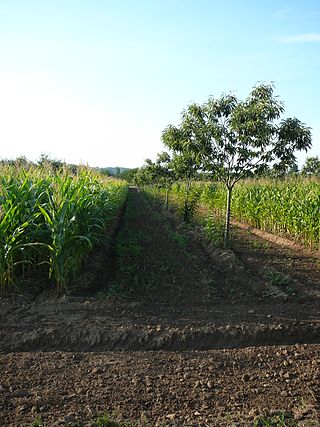
Agroforestry is a land use management system that integrates trees with crops or pasture. It combines agricultural and forestry technologies. As a polyculture system, an agroforestry system can produce timber and wood products, fruits, nuts, other edible plant products, edible mushrooms, medicinal plants, ornamental plants, animals and animal products, and other products from both domesticated and wild species.

Grevillea robusta, commonly known as the southern silky oak, silk oak or silky oak, silver oak or Australian silver oak, is a flowering plant in the family Proteaceae, and accordingly unrelated to true oaks, family Fagaceae. Grevillea robusta is a tree, and is the largest species in its genus. It is a native of eastern coastal Australia, growing in riverine, subtropical and dry rainforest environments.
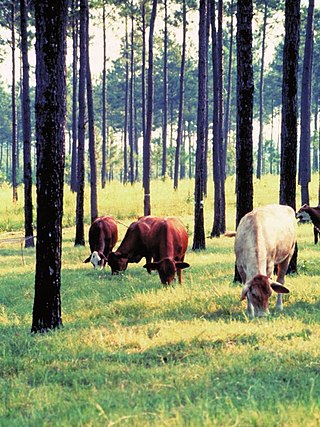
Silvopasture is the practice of integrating trees, forage, and the grazing of domesticated animals in a mutually beneficial way. It utilizes the principles of managed grazing, and it is one of several distinct forms of agroforestry.
Forest management is a branch of forestry concerned with overall administrative, legal, economic, and social aspects, as well as scientific and technical aspects, such as silviculture, forest protection, and forest regulation. This includes management for timber, aesthetics, recreation, urban values, water, wildlife, inland and nearshore fisheries, wood products, plant genetic resources, and other forest resource values. Management objectives can be for conservation, utilisation, or a mixture of the two. Techniques include timber extraction, planting and replanting of different species, building and maintenance of roads and pathways through forests, and preventing fire.
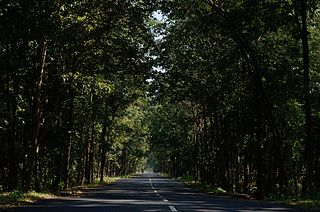
Social forestry is the management and protection of forests and afforestation of barren and deforested lands with the purpose of helping environmental, social and rural development. The term social forestry was first used in 1976 by The National Commission on Agriculture, when the government of India aimed to reduce pressure on forests by planting trees on all unused and fallow lands. It was intended as a democratic approach to forest conservation and usage, maximizing land utilization for multiple purposes.

Shade-grown coffee is a form of the crop produced from coffee plants grown under a canopy of trees. A canopy of assorted types of shade trees is created to cultivate shade-grown coffee. Because it incorporates principles of natural ecology to promote natural ecological relationships, shade-grown coffee can be considered an offshoot of agricultural permaculture or agroforestry. The resulting coffee can be marketed as "shade-grown".
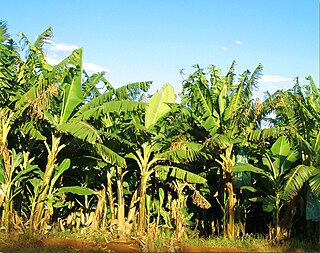
A banana plantation is a commercial agricultural facility found in tropical climates where bananas are grown.

Agroecology is an applied science that involves the adaptation of ecological concepts to the structure, performance, and management of sustainable agroecosystems. In Latin America, agroecological practices have a long history and vary between regions but share three main approaches or levels: plot scale, farm scale, and food system scale. Agroecology in Latin American countries can be used as a tool for providing both ecological, economic, and social benefits to the communities that practice it, as well as maintaining high biodiversity and providing refuges for flora and fauna in these countries. Due to its broad scope and versatility, it is often referred to as "a science, a movement, a practice."
One Acre Fund is a social enterprise that supplies smallholder farmers in East Africa with asset-based financing and agriculture training services to reduce hunger and poverty. Headquartered in Kakamega, Kenya, the organization works with farmers in rural villages throughout Kenya, Rwanda, Burundi, Tanzania, Uganda, Malawi, Nigeria, Zambia, and Ethiopia.

Deforestation is a major threat to biodiversity and ecosystems in Costa Rica. The country has a rich biodiversity with some 12,000 species of plants, 1,239 species of butterflies, 838 species of birds, 440 species of reptiles and amphibians, and 232 species of mammals, which have been under threat from the effects of deforestation. Agricultural development, cattle ranching, and logging have caused major deforestation as more land is cleared for these activities. Despite government efforts to mitigate deforestation, it continues to cause harm to the environment of Costa Rica by impacting flooding, soil erosion, desertification, and loss of biodiversity.

Trees for the Future is a Maryland-based nonprofit organization founded on August 14, 1989, that trains farmers around the world in agroforestry and sustainable land use.
Costa Rican agriculture plays a profound part in the country's gross domestic product (GDP). It makes up about 6.5% of Costa Rica's GDP, and 14% of the labor force. Depending upon location and altitude, many regions differ in agricultural crops and techniques. The main exports include: bananas, pineapples, coffee, sugar, rice, vegetables, tropical fruits, ornamental plants, corn, potatoes and palm oil.
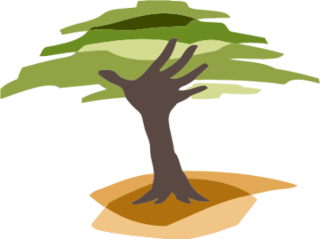
Eden Reforestation Projects (Eden) is a nonprofit NGO that works in developing countries to rebuild natural landscapes destroyed by deforestation. Eden works directly with communities experiencing extreme poverty resulting from the deforestation and destruction of the land that sustains them. The organization employs thousands of local community members and provides them with the education and tools necessary to plant, grow, and protect to maturity, millions of trees each year. Eden currently plants approximately 15 million trees a month, and in 2020 reached over 423 million trees planted of which over 225 million are mangrove trees.
Private Forests Tasmania is a Tasmanian government statutory authority established in 1994 by the Tasmanian Private Forests Act 1994. The Authority was created to provide assistance and advice on private forest management in Tasmania, Australia. The objectives of the authority are to facilitate and expand the development of the private forest resource in Tasmania, in a manner that is consistent with sound forest land management practices.

Bamboo forestry is a cultivation and raw material industry that provides the raw materials for the broader bamboo industry, worth over 72 billion dollars globally in 2019.

P. K. Ramachandran Nair is an Indian American agricultural scientist, Distinguished Professor of Agroforestry and International Forestry at the School of Forest, Fisheries, and Geomatics Sciences (SFFGS), Institute of Food and Agricultural Sciences (IFAS), University of Florida. He is known for his pioneering contributions to the science of agroforestry, for which he received global recognition including the Humboldt Prize (2006). The specific areas of his research include agroforestry in the tropics and subtropics, integrated farming systems, soil carbon sequestration and climate change mitigation, ecosystem services, and soil fertility management. He has written over 200 peer-reviewed articles, 17 books and over 80 book chapters.
The National Agroforestry Policy of India is a comprehensive policy framework designed to improve agricultural livelihoods by maximizing agricultural productivity for mitigating climate change. The Government of India launched the policy in February 2014 during the World Congress on Agroforestry, held in Delhi. India became the first country in the world to adopt an agroforestry policy.
Regenerative cacao is defined as cacao that is produced on a farm that employs regenerative agriculture and agroforestry methods. It is most closely associated with the Ecuadorian chocolate company To’ak, the organic food supplier Navitas, the rainforest conservation organization TMA, and the social-agricultural enterprise Terra Genesis. Cacao is the raw material that is used to produce chocolate.














